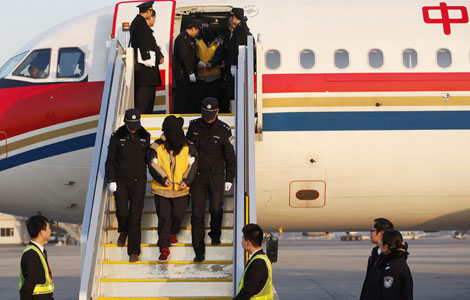From the Chinese Press
Updated: 2013-09-26 07:59
(China Daily)
|
||||||||
Shanghai metro shows the way
A clause added to the draft regulation of Shanghai metro management forbids passengers from eating on trains. Before the clause was added to the draft, surveys and opinion polls showed that more than 80 percent respondents favored such a ban in certain sections, says an article on gmw.cn. Excerpts:
Though commuters may differ on forbidding people from eating on trains, there is no denying that such activities create a problem for sanitation workers.
Many people still spit on and litter the streets despite knowing well that they are unhealthy habits. Perhaps regulations are needed to force people to change their uncivil and unhealthy habits.
Therefore, the public should support the draft regulation of the Shanghai metro management forbidding passengers from eating on trains. People who don't have enough time in the morning to eat breakfast at home can have it on the platform before or after boarding a train.
If people can abide by civil rules there wouldn't be any need to impose regulations. After all, laws and regulations are needed to make people follow certain rules that are beneficiary to society as a whole.
Elderly need better care
The decomposing bodies of an elderly couple were found in their rented home in Luoyang, Henan province, on Sept 18, a day before the Mid-Autumn Festival. Despite being the parents of three grown-up sons, the elderly couple died more or less unattended. The tragedy once again highlights the "empty-nest" problem facing the rising population of aging people in China, says an article in Youth Times. Excerpts:
Apart from being a time for family reunion, this year's Mid-Autumn Festival was also the first since a new regulation - effective from July 1 - made it mandatory for grown-up children to attend to the parents' financial and spiritual needs.
The death of the couple in Luoyang was indeed a tragedy, but it was not the first of its kind in China. The rising number of aging people has intensified the "empty nest" problem - grown-up children living and working away from their parents and thus being unable to visit them regularly.
The new regulation makes it mandatory for grown-ups to visit their parents more often, emphasizing the importance of family members' support for senior citizens. But the solution to the problem lies in whether the government, as the public service provider, can fulfill its responsibilities in providing proper care to elderly people.
The Ministry of Civil Affairs recently responded to criticism against a proposed house-for-pension program for elderly people, saying it was only a pilot program and the government would not shirk its responsibility of providing services for elderly people. This is a comforting message. But given the many tragic incidents in recent years, the government has to play a greater role in addressing the problems faced by the rising number of senior citizens.
We mustn't lose faith in altruism
Two migrant workers in their early 20s risked their lives to save a man and a woman from drowning in Hainan province recently. But in the process, one of the young men went missing and is now presumed drowned. What has upset the public most is that the two rescued people vanished from the spot without as much as thanking the duo for saving their lives, says an article in Beijing Times. Excerpts:
The valor and heroic deed of the two migrant workers will be remembered despite the ungratefulness of the ones whom they rescued. An earnest "thank you", rather than a reward, is enough to express gratitude for a good deed. But nowadays it happened frequently that people run away from acknowledging the good deed even after being saved from certain death, which is a pity.
Over the past few years, some good Samaritans have been wrongfully accused of things they didn't do. Even people who have returned money or other personal belongings have been falsely accused of stealing them.
A recent case in which a teenage girl escorted a pregnant woman home only to be murdered by the woman and her abusive husband after the latter's failed attempt to rape her has left many people wondering whether or not to help people in need.
In the Hainan incident, the best thing for the rescued man and woman to do would be to publicly acknowledge the debt they owe to the two migrant workers. But even if they do not do so, there is no reason for people to loose faith in the sanctity of good deeds.
Tolerance and understanding can make us understand why some people risk their lives to help or save others and why many of the possible victims refrain from thanking their saviors. Irrespective of what a few people think about altruism, good and selfless deeds by people are what differentiate one society from another.
(China Daily USA 09/26/2013 page12)

 Djokovic announces engagement to girlfriend
Djokovic announces engagement to girlfriend
 Taipei, LA and Singapore top travel search growth list
Taipei, LA and Singapore top travel search growth list
 Big cats are part of the family
Big cats are part of the family
 Arm exhibition at Russia Arms Expo 2013
Arm exhibition at Russia Arms Expo 2013
 Rubber duck adjusting to spot at Summer Palace
Rubber duck adjusting to spot at Summer Palace
 Suspects in financial offenses arrested in SE Asia
Suspects in financial offenses arrested in SE Asia
 China champs at the bit
China champs at the bit
 Echoes of China
Echoes of China
Most Viewed
Editor's Picks

|

|

|

|

|

|
Today's Top News
Ministry welcomes WTO poultry ruling against US
Xi reaffirms education top priority
China, Russia issue joint statement on Syria
China to improve policies for overseas investment
Airbus scores in China with $6b in deals
Concern about environment grows
Rich should fight poverty too: Ho
Li Tianyi jailed for 10 years for gang rape
US Weekly

|

|




